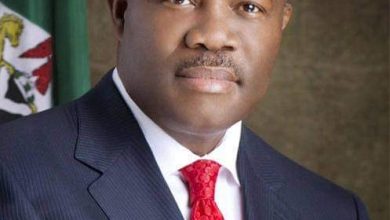NIGERIAN ECONOMY UNDER SERIOUS THREAT

Deficit on the Services Account in Q1 2022
The Nigerian economy is seriously under threat with consistent dwindling of its revenue basis compared to its ever rising debt profile . The most dangerous angle to this scenario is its inability to generate enough revenue to finance its debts . While the fiscal position is tight , the monetary authorities is also a dire strait as the nation’s exchange rate is in a mess resulting in free fall of naira relative to dollars . Nigeria recorded a current account surplus of USD2.6bn in Q1 ‘21, equivalent to 2.4% of GDP. The positive outturn on the current account was mostly due to a surplus of USD3.6bn on the trade account and to a lesser extent a small net deficit of -USD2.8bn on the services account (vs USD3.2bn in Q4 ’21). But today it is other way round as the drivers of the deficit on the services account as deficit on the services account relative to Q4 ’21 was mainly a result of a smaller net debit of -USD855m in other business services (inc. professional management consulting services) compared with -USD1.4bn in Q4 ’21.
Overall, the deficits on the services account have been modest since the onset of the pandemic in Q2 ’21 and have not recovered to pre-pandemic levels.
For context, the net deficit of -USD2.8bn recorded on the account in Q1 ’22 is just over a third of the -USD7.9bn deficit recorded in Q1 ’20 – at the start of the pandemic.
The primary reason is that fx expenditure on travel-related items, such as those for health and education as well as transportation, are still below their pre-pandemic run-rate. For instance, fx utilisation for education and health amounted to c.USD388m and USD72m in Q1 ’22 compared with USD1.6bn and USD682min Q1 ’20 respectively.
While the country’s appetite for imports is still strong, we believe that the CBN’s demand management strategies and stricter documentation requirements for fx allocation to eligible fx users may have reduced fx demand through official channels.
Total credits (inflow) on the services account totalled USD956m from USD962m in Q4 ’21. Transportation accounted for almost 49% or USD465m of total credits. This compares with a total debit (outflow) of -USD3.8bn.
Unlike a few countries on the continent such as Egypt, South Africa, Kenya, and Morocco that are able to generate fx inflow from services such as tourism, Nigeria lacks a vibrant service industry that will generate substantial amounts of fx inflow.
While the near-term prospects for developing such an industry are almost non-existent, appropriate strategies for its development in the medium to long term will require massive investments in education, health, security, and infrastructure.
BIGGER PICTURE
Nigeria’s gross oil and gas federation revenue for the first four months of the year was projected at N3.12 trillion but as at April 30, only N1.23 trillion was realised, representing a mere 39% performance.
Nigeria’s fiscal position worsened in the first four months of the year as the cost of repaying debt surpassed the government’s revenue in the first quarter of 2022.
According to details of the 2022 fiscal performance report for January through April, Nigeria’s total revenue stood at N1.63 trillion while debt servicing stood at N1.94 trillion, showing a variance of over N300 billion.
Nigeria’s Minister of Finance, Budget and National Planning, Zainab Ahmed, on Thursday warned that urgent action is needed to address the nation’s revenue challenge and expenditure efficiency at both the national and sub-national levels.
The report showed that gross oil and gas federation revenue for the first four months of the year was projected at N3.12 trillion but as at April 30, only N1.23 trillion was realised, representing a mere 39% performance.
Despite higher oil prices, the report showed that oil revenue underperformed due to significant oil production shortfalls such as shut-ins resulting from pipeline vandalism and crude oil theft as well as high petrol subsidy cost due to higher landing costs of imported products.
However, non-oil taxes trailed targets marginally, with average performance of 92.6%.
“Revenue performance is expected to improve in the second half of 2022 as a result of concerted efforts to address the oil theft and pipeline vandalism, the report said. It added that there is also seasonality to some of the non-oil taxes, which means that the nation expects to collect significantly more in the second half of the year.
“The improved revenue collection should also moderate the Debt Service to Revenue ratio, which is currently above our target level,” the report said.
The expectation of improved revenue collection should also moderate the debt service to revenue ratio, which is currently above the nation’s target level.
Precedent
In the first quarter of 2020, Nigeria’s debt service as a percentage of revenue rose to 99%, according to the Medium-Term Expenditure Framework and Fiscal Strategy (MTEF/FSP) report released by the Federal Ministry of Finance, Budget, and National Planning.
The data showed that in Q1 2020, Nigeria incurred a total sum of N943.12 billion in debt service while the Nigerian government retained revenue at N950.56 billion. In effect, Nigeria’s debt service to revenue was estimated to be 99% during the period.
On Thursday, the new report showed that the Nigerian government’s share of oil revenues in Q1 2022 was N285.38 billion (representing 39 percent performance), while non-oil tax revenues totalled N632.56 billion, representing 84 percent. In essence, the government generated N401.8 billion from company income tax (CIT) and value-added tax (VAT) as CIT and VAT collections were N298.83 billion and N102.97 billion, respectively, representing 99 percent and 98 percent of their respective targets.
Customs collections (made up of import duties, excise and fees, as well as federation account special levies) trailed target by N76.77 billion (25.42 percent) while the other revenues amounted to N664.64 billion, of which independent revenue was N394.09 billion.
Underlying Factors
The report noted that for Nigeria, “fiscal risks are somewhat elevated”, following weaker-than-expected domestic economic performance and structural issues in the domestic economy. It warned that revenue generation remains the major fiscal constraint of the nation and the systemic resource mobilization problem has been compounded by recent economic recessions.
The underlying factors also include the Russia and Ukraine war, which the report said has assumed a new and worrisome dimension with severe implications on food and energy prices. It listed the resurgence of COVID -19 in some major economies, which has led to slowdown in economic activities in those countries; as well as renewed elevated inflation in most economies, prompting monetary tightening in these economies with the inherent negative impact on capital inflow to emerging markets economies.
Also identified as a contributing factor is the challenging domestic macroeconomic and business environment and the negative impact of insecurity on the domestic economy.
“Efforts will however focus on improving tax administration and collection efficiency,” the report said.
“Crude oil production challenges and PMS subsidy deductions by NNPC constitute significant threat to the achievement of our revenue growth targets, as seen in the 2022 Performance up to April.
“Bold, decisive and urgent action is urgently required to address revenue underperformance and expenditure efficiency at national & sub-national levels.”






